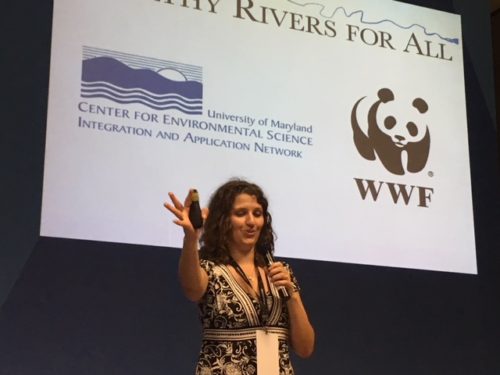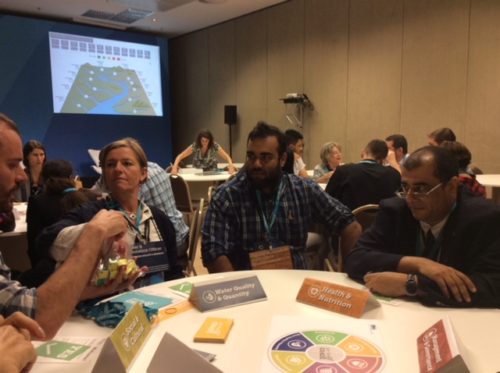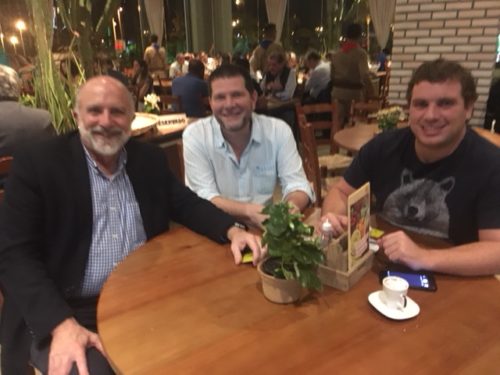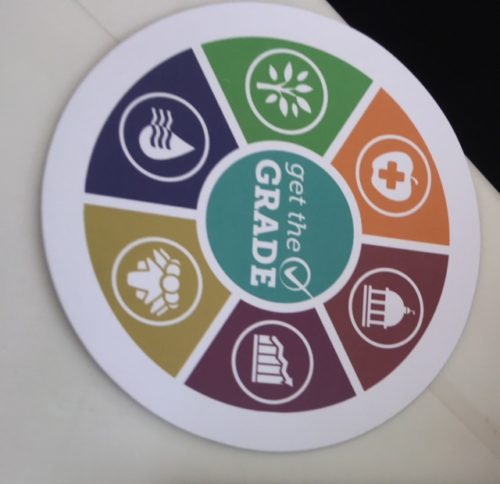The 8th World Water Forum in Brasilia
Bill Dennison · 1 commentsThe 8th World Water Forum was held in Brasilia, the capitol of Brazil. It was the largest conference I ever attended, with extremely large delegations from Asia, Europe, North America, South America, and Africa. The World Water Forum is held every 3 years and is sponsored by the World Water Council to “promote awareness, build political commitment and trigger action on critical water issues at all levels, to facilitate the efficient conservation, protection, development, planning, management and use of water in all its dimensions on an environmentally sustainable basis for the benefit of all life on Earth.” The World Water Forum is a big deal, so much so that there were demonstrations outside the Forum and an alternative World Water Forum was held in Brasilia as well to discuss the commodification of water in the world.
The Brasilia Ulysses Guimarães Convention Center hosted the talks and workshops, and there was a giant set of air conditioned tents set up to accommodate the pavilions of various sponsors. I attended on behalf of our Healthy Rivers for All partnership between the University of Maryland Center for Environmental Science (UMCES) and World Wildlife Fund (WWF). Catherine Blancard and Sarah Davidson from WWF also attended. WWF shared a pavilion with various non-governmental organizations (NGOs), united by the theme of “Nature’s Solutions.” Each of the pavilions hosted short talks that vied for the attention of the delegates who were walking by. I gave a talk on report cards with three other scientists: Joao Paulo Coimbra who talked about the Guanabara Bay report card that he was instrumental in developing, Jose Paulo Soares Azevedo (Ze Paulo) talked about the paper we are writing about Guanabara Bay, and Kennedy Onyango from Kenya talked about the Healthy Rivers for All course that he recently completed. I tried to thread it all together with an overview of our report card evolution. I also met many people who came to the pavilion and the example report cards that we brought were quickly snapped up.

I did sneak off from the Forum twice, once to work with Joao Coimbra on the Guanabara Bay paper that we started last year, and once to watch Ricky Arnold’s launch into space. WWF Brazil hosted a delightful dinner overlooking a lake and once again I was impressed with the amazing people who work for WWF. The Healthy Rivers for All team hosted a breakfast with members of their International Advisory Committee, and it was wonderful to actually meet people in person whom we have only "seen" on video or audio conference calls. I was also able to have a couple of lunches with Mark Pascoe, a member of the advisory committee, and dinner with Joao and Ze Paulo.

Brasilia is a planned city that became the capitol of Brazil in 1960. In some ways, it reminded me of Canberra, Australia, and Washington D.C., other planned cities established to host federal governments. These cities are largely inhabited by people who work for the federal government or in jobs associated with it. The capitol cities have large open spaces, with wide boulevards and artificial lakes. However, Both Brasilia and Canberra are decidedly not pedestrian friendly. I attended the International Riversymposium in Canberra in 2014, and walking around Canberra involved crossing busy streets with few crosswalks, just like in Brasilia.
While the center of Brasilia did not have the squalor of Rio de Janeiro, I missed the compact neighborhoods and the hustle and bustle of Rio. The WWF team found a nice hotel in one of the hotel districts, but it was a cab ride away from the restaurants. In Rio, you could walk out of the hotels and stumble upon a dozen restaurants within several blocks. But I felt safe in Brasilia, ate great food and enjoyed the company of various WWF staff from around the world.

I came away from the Forum with a sense of the growing importance of water across the globe. The arid countries and regions were well represented at the Forum, presumably due to their needed focus on water availability. Brasilia had recently experienced severe water shortages which heightened the issue locally. The current plight of Capetown, South Africa is a testament to the critical role that water availability plays in urban centers. There were some water treatment technologies that were being touted, as well as water stewardship initiatives.
The World Water Forum was a ‘paperless conference,’ so we used a conference app to navigate the various sessions. Unfortunately, the wireless was spotty in the conference center and nonexistent in the Expo tents. The food court was in the Brazilian National Stadium, the Maracanã, which hosted the opening ceremony of the 2014 FIFA World Cup. It reminded me of the World Bank headquarters in Washington, D.C. where you could choose from a host of global cuisines. It is where I ran into Australian friends Mark Pascoe and Stuart Bunn. I liked that the conference provided reusable water cups that we could fill up at the drinking fountains.
I helped host a session of the ‘Get the Grade’ game, appropriately held on World Water Day. Emily Nastase designed some very nice beer coasters, which we used to advertise the game session. As usual, playing the game was lots of fun and people enjoyed the role playing, competition with other tables, and putting forth arguments to sway fellow participants. I wrote a short poem to commemorate the occasion:

Get the Grade on World Water Day
22 March 2018
William C. Dennison
On World Water Day we came along to Get the Grade!
Here at the World Water Forum we played
With players from all around the globe
Using both instinct and their frontal lobe.
The prizes included river dolphins, oh so pink
Which made us try even harder, don’t you think?
Even though the Pandas brought prizes galore
Playing the game was, oh so much more.
We learned about the power of a report card
Something you can take to your own backyard
So THANK YOU for coming and playing along
We are sorry to have to say So Long!
About the author
Bill Dennison

Dr. Bill Dennison is a Professor of Marine Science and Vice President for Science Application at the University of Maryland Center for Environmental Science.
Next Post > Good luck and Godspeed, Ricky Arnold
Comments
-
Abrokwa Charles 7 years ago
Hi Bill,
That was a wonderful piece on the World Water project and how those initiatives are impacting lives in the hard-to-reach communities. A typical example is the one you cited in Cape Town, South Africa. You guys are doing marvelous job. Keep it up.